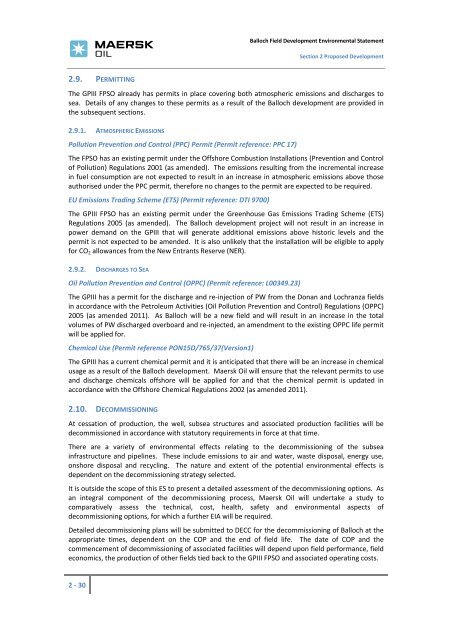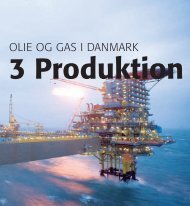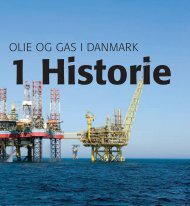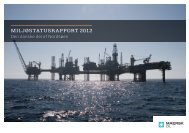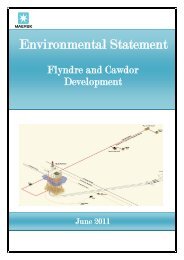Environmental Statement - Maersk Oil
Environmental Statement - Maersk Oil
Environmental Statement - Maersk Oil
You also want an ePaper? Increase the reach of your titles
YUMPU automatically turns print PDFs into web optimized ePapers that Google loves.
2.9. PERMITTING<br />
2 ‐ 30<br />
Balloch Field Development <strong>Environmental</strong> <strong>Statement</strong><br />
Section 2 Proposed Development<br />
The GPIII FPSO already has permits in place covering both atmospheric emissions and discharges to<br />
sea. Details of any changes to these permits as a result of the Balloch development are provided in<br />
the subsequent sections.<br />
2.9.1. ATMOSPHERIC EMISSIONS<br />
Pollution Prevention and Control (PPC) Permit (Permit reference: PPC 17)<br />
The FPSO has an existing permit under the Offshore Combustion Installations (Prevention and Control<br />
of Pollution) Regulations 2001 (as amended). The emissions resulting from the incremental increase<br />
in fuel consumption are not expected to result in an increase in atmospheric emissions above those<br />
authorised under the PPC permit, therefore no changes to the permit are expected to be required.<br />
EU Emissions Trading Scheme (ETS) (Permit reference: DTI 9700)<br />
The GPIII FPSO has an existing permit under the Greenhouse Gas Emissions Trading Scheme (ETS)<br />
Regulations 2005 (as amended). The Balloch development project will not result in an increase in<br />
power demand on the GPIII that will generate additional emissions above historic levels and the<br />
permit is not expected to be amended. It is also unlikely that the installation will be eligible to apply<br />
for CO2 allowances from the New Entrants Reserve (NER).<br />
2.9.2. DISCHARGES TO SEA<br />
<strong>Oil</strong> Pollution Prevention and Control (OPPC) (Permit reference: L00349.23)<br />
The GPIII has a permit for the discharge and re‐injection of PW from the Donan and Lochranza fields<br />
in accordance with the Petroleum Activities (<strong>Oil</strong> Pollution Prevention and Control) Regulations (OPPC)<br />
2005 (as amended 2011). As Balloch will be a new field and will result in an increase in the total<br />
volumes of PW discharged overboard and re‐injected, an amendment to the existing OPPC life permit<br />
will be applied for.<br />
Chemical Use (Permit reference PON15D/765/37(Version1)<br />
The GPIII has a current chemical permit and it is anticipated that there will be an increase in chemical<br />
usage as a result of the Balloch development. <strong>Maersk</strong> <strong>Oil</strong> will ensure that the relevant permits to use<br />
and discharge chemicals offshore will be applied for and that the chemical permit is updated in<br />
accordance with the Offshore Chemical Regulations 2002 (as amended 2011).<br />
2.10. DECOMMISSIONING<br />
At cessation of production, the well, subsea structures and associated production facilities will be<br />
decommissioned in accordance with statutory requirements in force at that time.<br />
There are a variety of environmental effects relating to the decommissioning of the subsea<br />
infrastructure and pipelines. These include emissions to air and water, waste disposal, energy use,<br />
onshore disposal and recycling. The nature and extent of the potential environmental effects is<br />
dependent on the decommissioning strategy selected.<br />
It is outside the scope of this ES to present a detailed assessment of the decommissioning options. As<br />
an integral component of the decommissioning process, <strong>Maersk</strong> <strong>Oil</strong> will undertake a study to<br />
comparatively assess the technical, cost, health, safety and environmental aspects of<br />
decommissioning options, for which a further EIA will be required.<br />
Detailed decommissioning plans will be submitted to DECC for the decommissioning of Balloch at the<br />
appropriate times, dependent on the COP and the end of field life. The date of COP and the<br />
commencement of decommissioning of associated facilities will depend upon field performance, field<br />
economics, the production of other fields tied back to the GPIII FPSO and associated operating costs.


